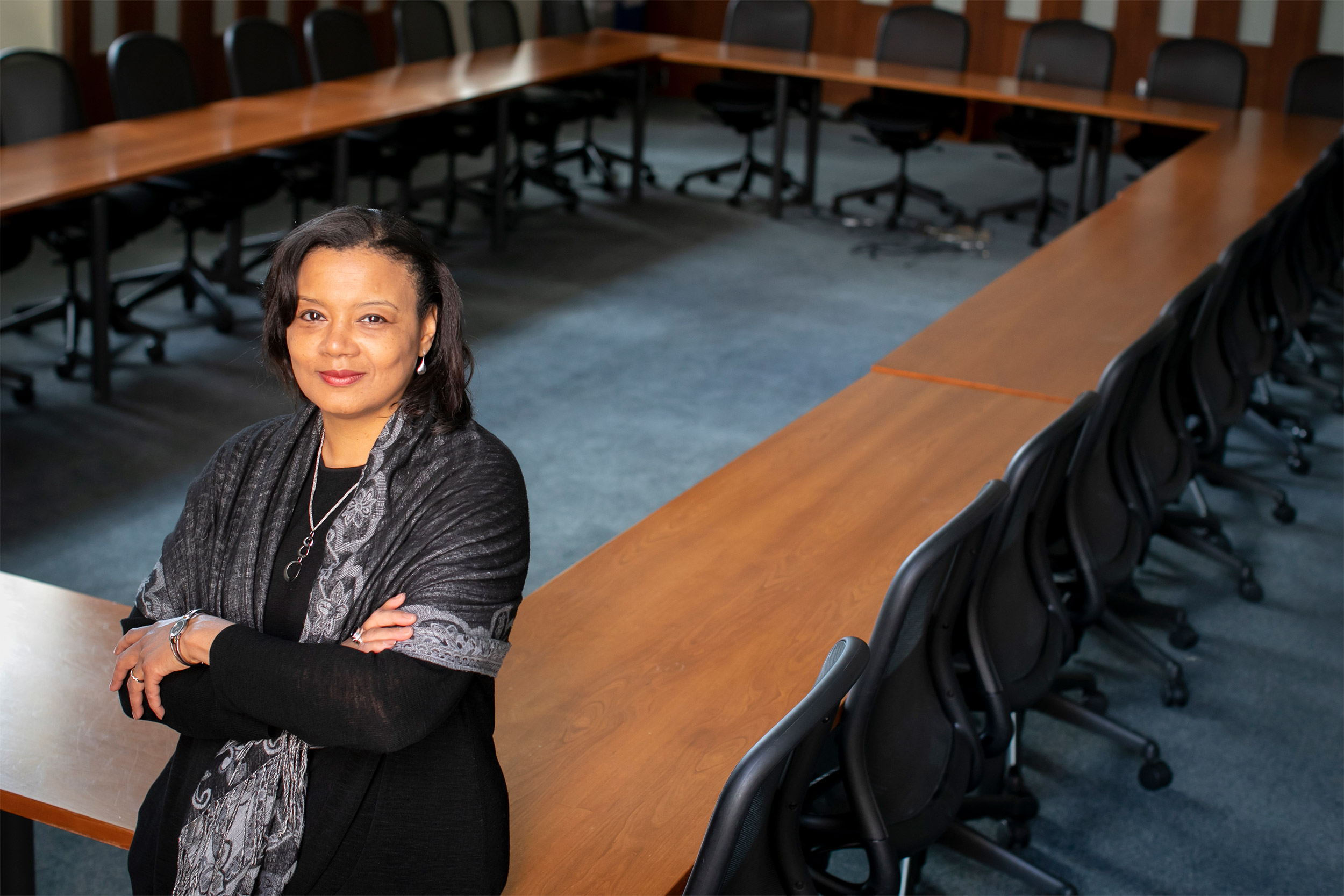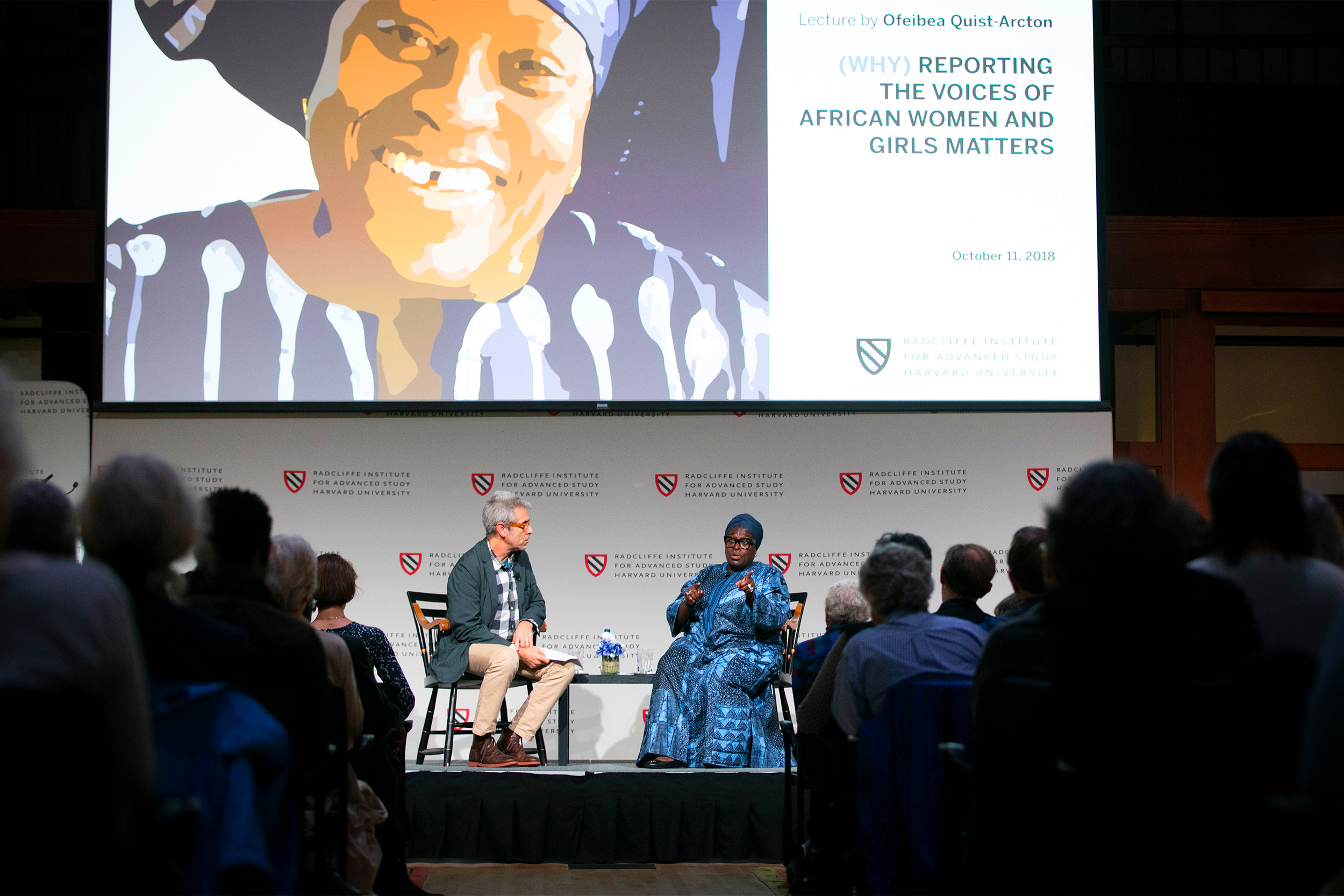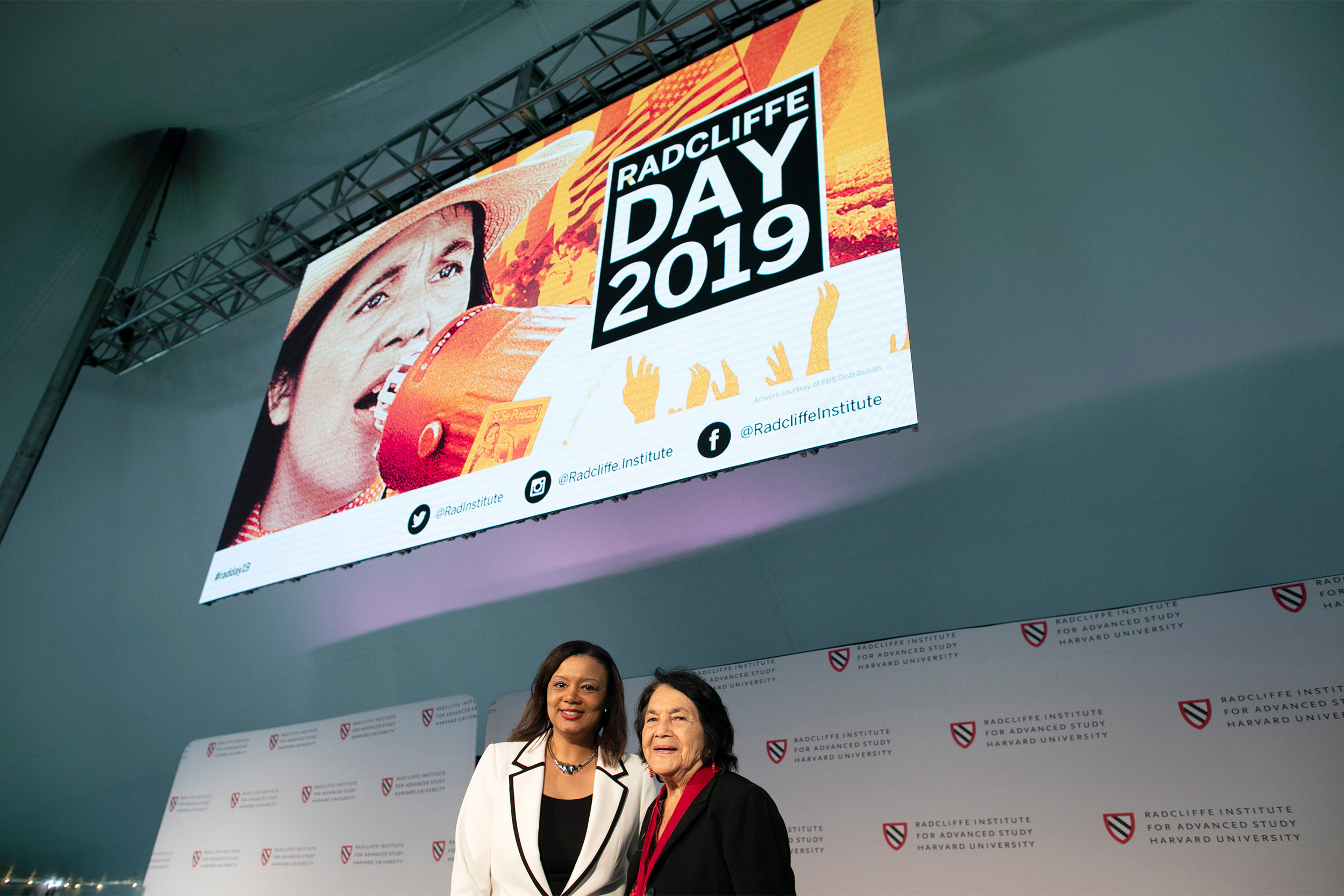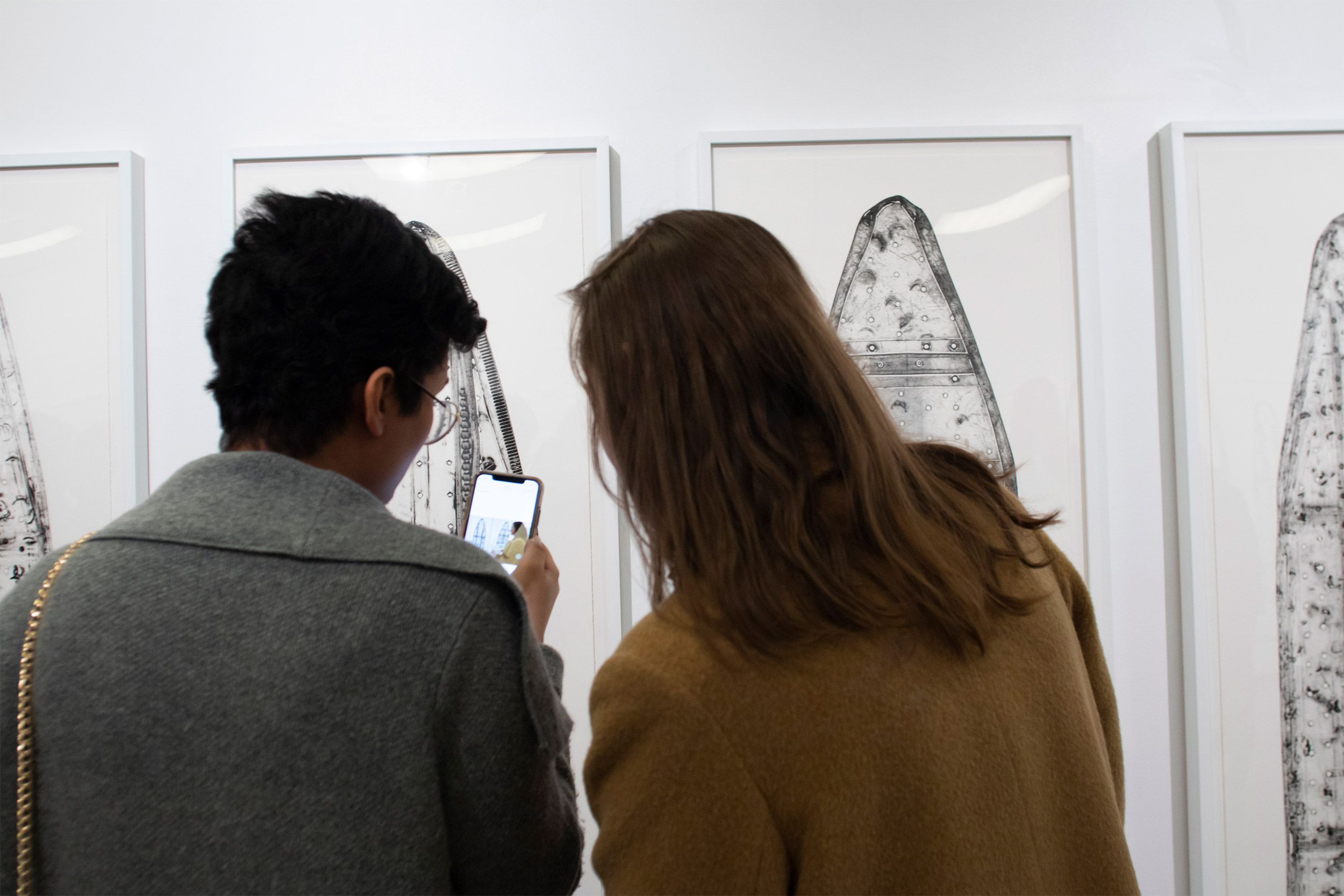
Radcliffe Dean Tomiko Brown-Nagin has a new strategic initiative to connect with Harvard and the community beyond Harvard’s gates.
Rose Lincoln/Harvard file photo
Brown-Nagin on her own path and Radcliffe’s
Dean discusses her priorities for Harvard’s institute devoted to interdisciplinary study and research
Tomiko Brown-Nagin’s intellectual interests and pursuits are varied, connected, and run deep. So leading an institution devoted to interdisciplinary work and research seems the perfect fit for the dean of the Radcliffe Institute for Advanced Study. Brown-Nagin said her years growing up in South Carolina after the passage of the Civil Rights Act inspired her interest in law, and her exposure to “the life of the mind” in college drove her love of history. The joy in exploring both, she said, “explains why I am here.” A historian, lawyer, and authority on constitutional law, she is the Daniel P.S. Paul Professor of Constitutional Law at Harvard Law School and a history professor in Harvard’s Faculty of Arts and Sciences. Brown-Nagin, who was a Radcliffe fellow in 2016‒2017, recently spoke with the Gazette about her vision for the institute and the concept of Radcliffe Engaged, her new strategic initiative to connect with Harvard and the community beyond Harvard’s gates.
Q&A
Tomiko Brown-Nagin
GAZETTE: You’ve been on a listening tour during your first year as Radcliffe dean. What have you learned?
Brown-nagin: I would say a couple of things came across most prominently. One is the depth of the passion for the idea of interdisciplinary research. It’s not always intuitive why that’s valuable, particularly for those who are not on campus. And yet, the goal of bringing together scholars from across the arts, the humanities, the social sciences, the sciences to create an interdisciplinary community is a mission that many people understood to be a unique contribution in the Harvard landscape. I heard repeatedly how critical Radcliffe’s mission is, and that it’s indispensable at Harvard. Another point that came across clearly from my interactions, with some of our past fellows in particular, is the transformative impact that Radcliffe has on academic careers. In part that’s because of the protected time we offer scholars to conduct research. The impact also is due to the level of exposure Harvard offers that virtually no other university can; fellows are able to make connections with important scholars here on campus and build community within their fellowship class. I enjoyed that unparalleled experience during my own fellowship in 2016-17. I found it was just a marvelous time to get away from my normal duties at the law school and FAS (which I enjoy) and have the opportunity to slow down and meet even scholars here on Harvard’s campus whom I knew about but hadn’t really had the time to interact with.
“In anticipation of Radcliffe’s 20th anniversary next year and as the institute’s fourth dean, I thought it was a great moment to assess where we have been, to reflect on what we’ve built over time, and to think about how we could grow to be even better.”
GAZETTE: Can you outline your new strategic plan, Radcliffe Engaged?
Brown-nagin: In anticipation of Radcliffe’s 20th anniversary next year and as the institute’s fourth dean, I thought it was a great moment to assess where we have been, to reflect on what we’ve built over time, and to think about how we could grow to be even better. I came into the strategic plan understanding that the prior deans have built an incredibly strong foundation and that each had moved the institute onto a new plane. Drew Faust played a pivotal role as founding dean. Barbara Grosz expanded the sciences and public programming. Liz Cohen put the institute on the map as a center for arts. Through the strategic planning process, I wanted to learn where there were growing edges at the institute, even as I understood that it’s a fabulous place for all the reasons I’ve articulated. I also thought that the process of engaging in a strategic plan would be a way to build community internally.
GAZETTE: Can you talk about particular areas that Radcliffe Engaged will focus on moving forward?
Brown-nagin: The plan lists six strategic goals, and I will emphasize just two of them here. The first point I want to make, however, is about Radcliffe’s enduring identity. The institute is a laboratory of ideas that brings together scholars, artists, writers, and professionals from many fields to create a diverse community to pursue projects on the leading edges of disciplines. One of our strategic goals is to ensure that the community of Radcliffe researchers includes scholars who are interested in responding to pressing issues of the day — to concerns about the nature and health of our democracy, the rule of law, inequality, the environment, access to education, among other issues. We want to model how institutions of higher education can grapple with and inform discussions of such pressing issues and contribute to the world outside the campus gates. One way to achieve that goal is to promote engaged scholarship, ideas that seek to be impactful in terms of policy or law, for example. Engaged scholarship is consistent, I think, with some of the goals [Harvard] President [Larry] Bacow has discussed related to making sure Harvard is seen not just as serving the people on campus, but also as offering something to the broader community. I would also emphasize a second strategic goal of expanding our engagement with students. In the coming years we need to ensure that Harvard students appreciate the unique contributions that Radcliffe can make and already is making to their educational experiences.


Democracy, inequality, and the arts are just three areas that support Radcliffe’s identity as a “laboratory of ideas.” Among those who spoke at Radcliffe were National Public Radio reporter Ofeibea Quist-Arcton and Dolores Huerta, who was awarded the Radcliffe Medal.
Stephanie Mitchell/Harvard file photos
GAZETTE: Can you describe what that expanded engagement with students will look like?
Brown-nagin: First, I should note that there’s continuity as well as change with respect to this goal. Radcliffe currently serves hundreds of students each year through research at the Schlesinger Library and the Radcliffe Research Partners program. Students also help design some of the programming sponsored by Academic Ventures [the part of the institute that hosts conferences, symposia, and public talks]. What we want to do through the strategic plan is amplify and grow our student engagement. The key to that engagement is our interdisciplinary method. We are going to offer Harvard undergraduates and graduate students the opportunity to engage in interdisciplinary research and convene in much the same way as some our fellows and other scholars do at Radcliffe. We envision students submitting proposals about research projects they want to pursue that feature an interdisciplinary component. For instance, a student might submit an idea for an interdisciplinary project on climate change and seek to bring together a larger group of students to workshop ideas and stage a capstone convening around the resulting ideas. We also are endeavoring to expand our reach beyond the Harvard campus to talented students who are interested in and in need of research-driven solutions to pressing problems but who don’t have access to the kinds of resources and people that we at Harvard are accustomed to every day. We’re planning a summer program that would be geared to a talented pool of high school students who would partner with Harvard students interested in service on issues that lend themselves to interdisciplinary exploration. A capstone project would allow these students to return to their communities with research-based ideas about how to tackle an issue of the day that they’re passionate about.
GAZETTE: With Radcliffe Engaged you are targeting scholarly focus areas, and you’ve identified the law, education, and justice. Why start there?
Brown-nagin: We are starting with two focus areas, one on youth leadership, the other, as you’ve indicated, on law, education, and justice, a research cluster about the educational, family, and neighborhood impacts of mass incarceration. One reason we selected this focus area is that it builds on past endeavors but also is highly relevant to our times. Prior Radcliffe Fellows and professors have been deeply engaged in this area. I’m thinking, for example, of Devah Pager, our late colleague and a consummate, engaged intellectual who conducted sophisticated research that had an impact on national policy conversations at the intersection of race, employment, and incarceration. Devah’s work serves as a model for the kind of engaged scholarship that we want people to know the Radcliffe Institute supports. We hope to make it clear to interested scholars and students that we’re putting a stake in the ground in the law, education, and justice space. This focus area is meant to be a multiyear and more intensive version of the institute’s thematic years. We hope to engage a cluster of scholars, students, and others on and off campus around this issue, an area where there is a growing, bipartisan consensus around the need for reform.
GAZETTE: Are there other areas of focus you are hoping to explore in the future?
Brown-nagin: We also are interested in potentially focusing on mental health and higher education with the goals of promoting balance between achievement and self-care and destigmatizing mental health care. I’ve spoken with students and with supporters of the Radcliffe Institute, including members of our advisory councils, who are deeply interested in the topic. And of course, there are many researchers on Harvard’s campus working in this area. I could see Radcliffe as a destination for convening scholars from different disciplinary perspectives (from the Medical and Public Health Schools, the Ed School, sociology, and others) around a conversation about mental health and higher education. It’s an area that is ripe for the kind of engaged, interdisciplinary exploration for which Radcliffe seeks to be better known.

GAZETTE: I’d love to hear a little more about your background and how it informs your work today. It seems like you took an interdisciplinary approach to your own academic career.
Brown-nagin: When I was growing up, I was interested from an early age in being a lawyer, in particular a civil rights lawyer. I was born and raised in the Deep South in the years following the passage of the landmark Civil Rights Act and the relevance of the law was clear to me even when I was in grade school. I thought it was a great way to be of service, the usual reason that many people go to law school. And yet I attended a liberal arts college as an undergraduate, and it exposed me to the life of the mind in a way that was just impossible to resist. Heading into my senior year, when I was supposed to be filing my law school applications, I thought maybe I should go to graduate school in history. I had majored in history and developed a close relationship with a mentor [Marian Strobel] who had received her Ph.D. in history from Duke. So long story short, I ended up applying to both law schools and to Ph.D. programs in history. I figured the schools would make the decision about my life’s direction for me. I thought, “Surely, I won’t get into both [types of schools].” But then I did! And the choice about which path to pursue was thrown right back to me. I deferred my law school admission and went to Duke to start a Ph.D. program and was able to complete a master’s degree after a year. Then I attended Yale Law School, and there I realized that law school was compatible with the kind of intellectual work that I was doing at Duke. And ultimately, I figured out that I didn’t actually have to make a choice, that I could pursue my long-standing commitment to law and equality, and also pursue this relatively late-breaking interest in archival research, in digging into the past in order to try to make sense of the present. And now I feel so very fortunate that I pursued both interests! It wasn’t easy to do. Many people discouraged me. I was told by so many people: “You can’t do both; you have to choose this modality of scholarship or that one.” I rejected that false choice. I designed and pursued a Ph.D./J.D. between two different institutions at a time when that was not at all common. But that experience, and the joy that I’ve had pursuing both law and history, explains why I’m here.
GAZETTE: How do you see that experience helping you in this new role that is all about bringing together different disciplines?
Brown-nagin: I embody the interdisciplinary scholar. Certainly, my own experience is embedded and reflected in my interest as the dean of Radcliffe in promoting that interdisciplinary method and engaged scholarship. My own experience also is reflected in the student engagement component of our strategic priorities. I’m certain that students have much to learn from looking at the world through an interdisciplinary lens. I understand why we ask students to choose majors, but I think that learning from multiple disciplinary perspectives and multiple methodologies is invaluable. It’s foundational to critical thinking. Our world is so complicated. One can’t just look at the world through the lens of history, or engineering; one needs to have to have a broader base of knowledge. And so I feel passionate about giving students that opportunity, through Radcliffe, to pursue an interdisciplinary mode of study.
GAZETTE: Will you continue to teach as dean?
Brown-nagin: I am going to teach my freshman seminar in the spring, and I will teach it in the newly renovated Schlesinger Library in a seminar room that has fantastic multimedia capabilities. It’s beautiful. My freshman seminar is about the Supreme Court and social reform, and it really lends itself to using materials from the library, so I think it’ll be great to teach there. As dean, I am not required to teach, but I am taking on that load in part because my interactions with students are energizing. They remind me what this is all about. I also see my teaching as a part of Radcliffe Engaged. The seminar’s subject matter is at that intersection of historical and legal scholarship that touches on, or at least gestures toward, the present.
GAZETTE: What do you see as the biggest challenge ahead?
Brown-nagin: It’s a very challenging time for the world and for higher education. Higher education is often under rhetorical attack. There is understandable concern about the cost of higher education, and there’s a lot of scrutiny of whether higher education adds value to the broader world. Also, a lot of the division outside the gates is reflected internally. We’re living in an unstable period of history, and it is a very challenging environment in which to be a leader in higher education. And yet, this age also presents exciting opportunities. We, as leaders, have a responsibility to think through and show that we are relevant, to make sure that we are opening ourselves up to people outside the campus gates, and at Radcliffe to make sure we are doing interdisciplinary research that addresses pressing issues of the day. We have to engage.




